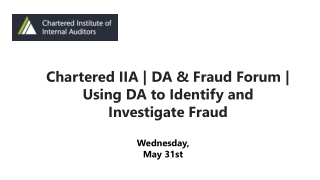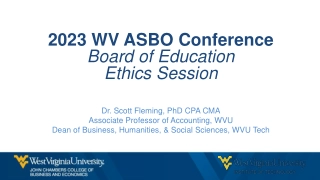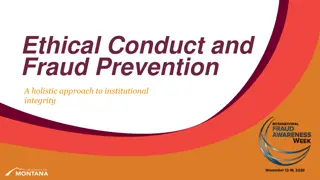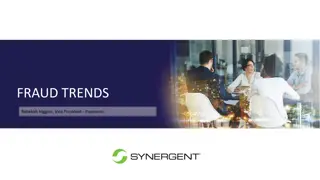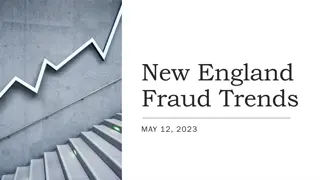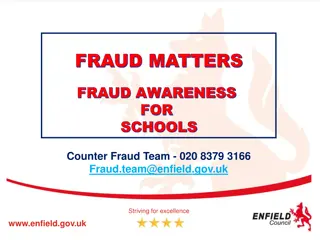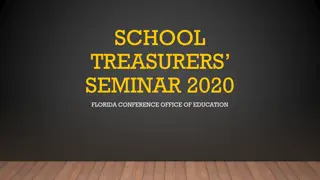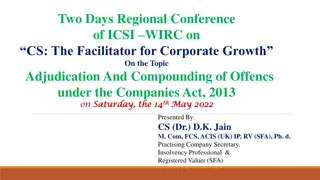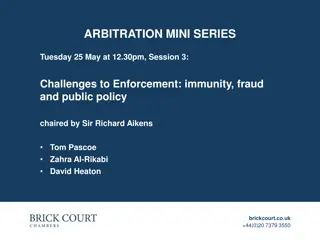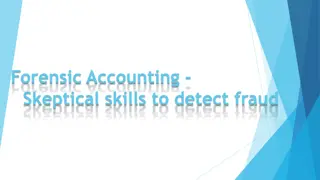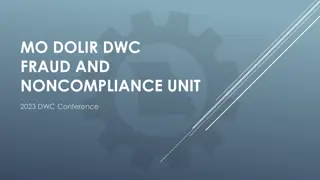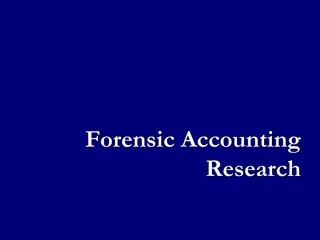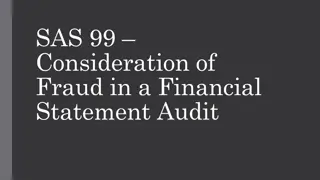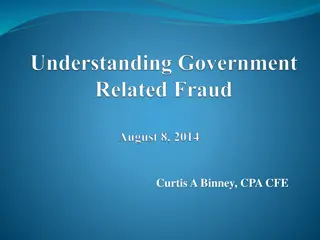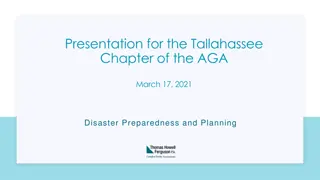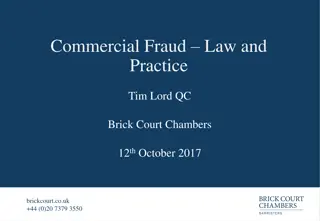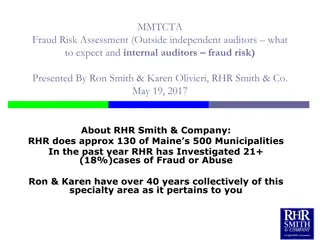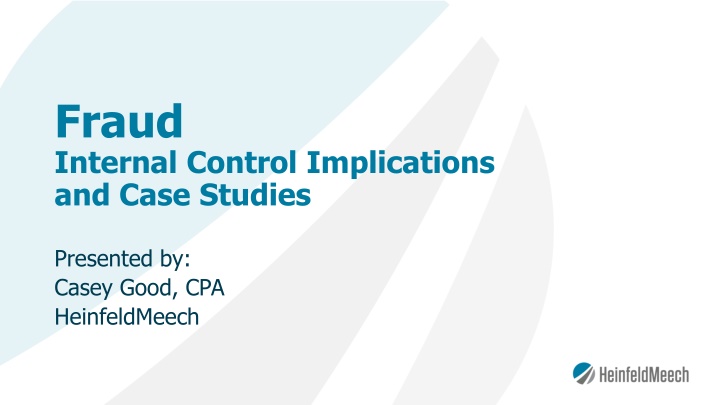
Fraud: Implications, Case Studies, and Prevention
Explore the world of fraud with insights on its prevalence, types, detection methods, control weaknesses, red flags, and the fraud triangle. Delve into the pressures, rationalizations, and opportunities that lead individuals to commit fraudulent activities, and learn about key control measures to prevent fraud in organizations.
Download Presentation

Please find below an Image/Link to download the presentation.
The content on the website is provided AS IS for your information and personal use only. It may not be sold, licensed, or shared on other websites without obtaining consent from the author. If you encounter any issues during the download, it is possible that the publisher has removed the file from their server.
You are allowed to download the files provided on this website for personal or commercial use, subject to the condition that they are used lawfully. All files are the property of their respective owners.
The content on the website is provided AS IS for your information and personal use only. It may not be sold, licensed, or shared on other websites without obtaining consent from the author.
E N D
Presentation Transcript
Fraud Internal Control Implications and Case Studies Presented by: Casey Good, CPA HeinfeldMeech
Why talk about fraud? Total losses in 2016 estimated at $6.3 billion Only reported fraud Estimate organizations lose 5% of revenues annually Most occur for 18 months before discovery $3.5 trillion annually Median loss - $150,000 per incident 95% of fraudsters are first time offenders 2
The Fraud Triangle Rationalization Pressure Opportunity
Pressure/Incentive Overwhelming desire for personal gain Living beyond their means Close association with customers High personal debt Feeling pay not commensurate with responsibility Wheeler-dealer attitude Strong challenge to beat the system Excessive gambling habits Undue family or peer pressure No recognition for job performance
Rationalization Not about justifying theft that has already occurred Necessary component of crime before it takes place Part of the motivation for the crime After criminal act has taken place, rationalization will often be abandoned Once line is crossed, illegal acts become more or less continuous
Opportunity Placing too much trust in key employees Lack of proper procedures for authorization of transactions Inadequate disclosures of personal investments and incomes No separation of authorization of transactions from custody of related assets Lack of independent checks on performance Inadequate attention to details No separation of custody of assets from the accounting for those assets No separation of duties between accounting functions Department that is not frequently reviewed by internal auditors Lack of clear lines of authority and responsibility Perception of detection is biggest deterrent to fraud
What can we do? Establish Internal Controls! Just any controls? Reasonable Assurance/Absolute Assurance Efficiency? Fraud Risk Assessments Vulnerabilities in the entity Transaction cycles Others? 12
CASE STUDIES 13
Ohio Department of Transportation ODOT empowered District 12 Facilities Manager and Equipment Superintendent with direct purchasing authority Treated their personal subsidiary companies as unrelated enterprises as long as they had unique TINs Circumvented competitive procurement practices and received kick back from vendors Doctored ODOT quotes, fictitious letterheads, forged signatures Spanned more than a decade costing the state at least $11M 14
ODOT Benefits Thousands worth of stolen ODOT tools and equipment Yacht trip to Lake Erie with vendors and strippers Bar tabs at strip clubs throughout NE Ohio Hunting trips to game ranches in TX with imported exotics Golf outings at country clubs Hotel and meals in Vegas Foreign adult excursions 15
ODOT Resolution 6 ODOT officials convicted, 12 vendors convicted Sentences ranged from 6 months to 7 years $600k in restitution Filed nearly 500 counts, 150 witness statements 16
What would you do? Segregation of duties Limited authority granted to individuals Internal audits Conflict of interest statements Budget to Actual reporting Question strange expenses 17
Roslyn School District, New York District employees used at least $11.2 million of school funds for personal benefit over 8 years Clean audit opinions issued by external auditors Home Depot employee eventually blew the whistle 18
What went wrong in Roslyn? Complete breakdown in internal controls Superintendent and asst superintendent could override system and process payments outside of normal flow of transactions Two employees in charge of reconciliations did not do their job, failed to identify issues Board failed to oversee and monitor financial activities Independent auditor had conflicts of interest and performed work so flawed and so below professional standards it failed to identify the millions stolen 19
The costs Private mortgages and loans $1.1 million of district funds used to make payments on private mortgages and loans to superintendent, business manager, and district account clerk Businesses established by district officials payments of over $1 million made to businesses created by district officials, family members, and friends Supers were withdrawing cash at the rate of $700/day and had 24 different credit cards 20
The costs Unauthorized salaries $549K in excessive salaries paid to certain district officials Financing of private automobiles $207K used to purchase or lease automobiles for superintendent, asst superintendent and family, including BMW and Jaguar In addition to their vehicle allowance of $8,000 a year, later increased to $17,200 Home Depot purchases $609K for goods not used at the district 21
The costs Payments for personal insurance policies $160K paid for various personal life, homeowners, car, and boat policies Unauthorized travel $133K paid for travel not related to school business for various officials and non-school district employees, including travel to Las Vegas, San Francisco, Bermuda, and London on the supersonic Concorde Superintendent s parking $42K was paid for parking in Manhattan 22
What would you do? Segregation of duties Review of management expenditures Reconciliation of receipts Controls over cash outlays Conflict of interest statements Budget to Actual reporting Question strange expenses 23
Tips for Avoiding Fraud Internal Controls Separate duties of receiving, disbursements, writing checks, signing checks, and reconciling accounts Look for forgery, missing checks, payee information not disbursements ledger Monthly bank statement should be delivered unopened to individual without banking authority for review Unusual transactions Trend analysis (declining deposits) Unfamiliar payees for large amounts 24
Tips for Avoiding Fraud System Controls Have an accounting program expert do initial set-up Access to personnel and vendor master file records should be password protected and restricted by job function System should create an audit trail of all changes made to vendor master file records and personnel records Changes to either should require supporting documentation, supervisory approval, and review 25
Tips for Avoiding Fraud - Education Employees who receive regular and recurring training about fraud are more likely to help control it Cross train individuals and have mandatory vacation and/or rotation of duties Have avenues for whistleblowers and anonymous tips both internal and external Conduct internal audits randomly, can be a powerful deterrent 26
Questions? Casey Good, CPA HeinfeldMeech Casey.good@heinfeldmeech.com 27

